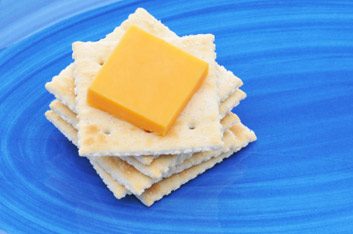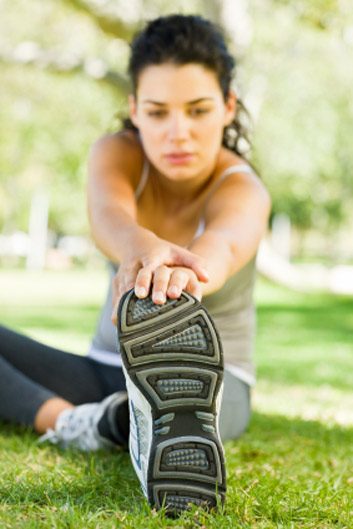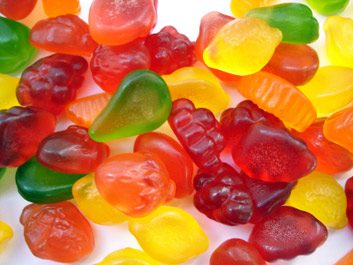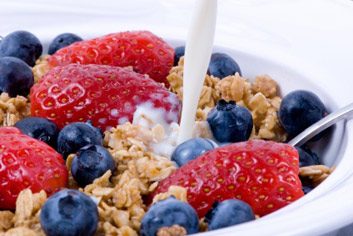
Criminal behaviour
Maybe you just can’t stay away from those 100-calorie snack packs, or you love to doze until noon every Sunday. How bad can these little health crimes be? As it turns out, certain small habits can have a big impact on your health. Read on to find out how these crimes are thwarting your health and how to fix them.

The crime: Munching on too many “100-calorie snacks”
Why it’s bad
These snacks often leave you unsatisfied, says Gina Sunderland, a Winnipeg-based registered dietitian. “Things like cookies and crackers don’t typically have enough fibre or protein to lead to a feeling of fullness,” she says. “So many people will have another and another.”
The fix
Reach for filling snacks that are a mix of protein and fibre, such as a small handful of almonds, low-fat cheese and crackers or low-fat yogurt, which often hits the sweet tooth while packing a protein punch. Or Sunderland suggests trying a do-it-yourself 100-calorie snack, such as two cups of strawberries, one small apple and a thumb width’s of skim milk cheese, or three dried apricots and six almonds.
Related:
• 10 snacks that will help you lose weight
• 10 quick and healthy snacks to stash at work
• 100-calorie snacks you can make at home

The crime: Not stretching enough, especially post-exercise
Why it’s bad
Women tend to focus more on body composition changes and not enough on being healthy, says Helen Vanderburg, owner of Heavens Fitness in Calgary. “In order to keep our joints healthy and reduce the risk of injury, we need to make stretching a part of our workout program.”
The fix
Sneak your stretching in, suggests Vanderburg. “Stretch while watching TV or folding laundry-all it takes is four stretches, each of which you hold for a minute,” she says. Vanderburg’s recommendations:
• A stretch for your chest and front shoulders, such as interlacing hands behind your back and lifting the arms
• A stretch for the front of the hips, such as a lunge
• A stretch for the hamstrings, such as a forward bend
• A spine twist while seated or standing
Related:
• Stretch your hips with Standing Pigeon
• How hot yoga helps my running

The crime: Snacking on “fat-free” candy such as licorice and jujubes
Why it’s bad
Eating high-sugar candy adds empty calories to your diet and leads to tooth decay. “The sugar also stimulates your pancreas to put out extra insulin to try and normalize your blood sugars,” says Sutherland, “and that leads to craving more simple sugars.”
The fix
Try picking sugar- and fat-free alternatives, such as sugar-free gum, for that sweet fix. “Or put yourself on a ‘treat budget’ so you don’t have to give up these favourite sugary snacks entirely,” says Sunderland. “This way you’re limiting your frequency and controlling portion size.”
Related:
• 5 foods that will destroy your teeth
• 17 painless ways to cut calories
• 8 ways to reduce your portions

The crime: Sleeping in on the weekends…by hours
Why it’s bad
Admittedly most of us are sleep-deprived and try to make up for it on the weekend, notes Sharon Chung, staff scientist with the Sleep Research Laboratory at Toronto’s University Health Network. “But our bodies are like clocks and the clock controls many hormonal and physiological systems in our bodies,” she says. “And if we throw the clock off, our bodies won’t know when to go to sleep and that can lead to conditions such as insomnia.”
The fix
As best you can, keep a normal sleep routine seven days a week. So do what you do on the weekends before bed that you do during the week: take a bath, read and so forth. “And try not to sleep in too late if you can-if you sleep in until noon, then you won’t be ready to go to sleep at 11 p.m. that night,” says Chung. And minimize how long you do actually sleep in-by maybe an hour or so as opposed to three hours.
Related:
• 5 steps to a perfect night’s sleep
• 13 ways to beat menstrual insomnia
• Eat to sleep better

The crime: Not drinking enough milk
Why it’s bad
“You’re robbing your body of key nutrients such as calcium, vitamin D and vitamin A,” notes Sunderland. “We all know calcium helps maintain strong bones, but recent research shows adequate calcium in the diet also stimulates enzymes which burn fat.” Bonus-milk is packed with vitamin B12, a known sleep enhancer.
The fix
Like the stretching, sneak milk into your day so you don’t have to go head to head with a whole glass. So for breakfast, opt for a latte made with milk, cereal with milk or make your hot cereal with milk instead of water. And before bed, down a hot chocolate or decaf chai tea latte made with milk, suggests Sunderland.
And if you can’t-or prefer not to-drink milk, fear not, because you have plenty of alternative calcium sources, including fortified soy or rice milk and fortified orange juice (amount depends on brand); 1/2 cup of almonds (200 mg of calcium) and 1/2 cup of canned salmon with the bones (180 mg of calcium). Other sources that contain lesser amounts of calcium include sardines, navy beans and tofu.
Related:
• Osteoporosis: Why you need to act now
• Surprising sources of dietary calcium

The crime: Thinking you can spot-reduce body parts with specific exercises
Why it’s bad
“Women still secretly believe they can spot-reduce,” says Vanderburg. The downside is that it sets you up for fitness frustration and failure. This in turn can lead to negative self talk. Instead, focus on the health gains, such as overall weight reduction, or strengthening muscle.
The fix
It’s not as if you have to give up your 50-crunches-a-day habit. But give yourself a reality check, says Vanderburg, and accept that while those crunches will strengthen your abs, they won’t remove belly fat. Instead, work on creating an overall fitness program incorporating the holy trinity of fitness: cardiovascular work, strength training and flexibility.
Related:
• 8 fun ways to stay in shape
• The only 7 exercises you’ll ever need
• 4 ways to burn more calories when walking

The crime: Skipping breakfast
Why it’s bad
You might think it’s an easy calorie save. But the save catches up with you because you’ll likely eat more later in the day, especially at night, says Sunderland. “Research shows breakfast is the most important meal of the day because it takes the body from a state of resting metabolic rate to actively burning calories,” she says. “It prevents the body from going into a state of starvation and conserving calories.”
The fix
Prep the night before and lay out a grab-and-go breakfast such as a high-fibre cereal bar, a piece of fruit you’ve already washed and a handful of almonds or even an egg boiled the night before.
Related:
• Our best healthy breakfast recipes
• 3 steps to a better breakfast
• Breakfast Power Smoothie
